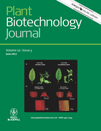
Journal of Genetic Engineering and Biotechnology
Scope & Guideline
Leading the Charge in Genetic Research and Applications
Introduction
Aims and Scopes
- Genetic Engineering Techniques:
The journal emphasizes innovative techniques in genetic engineering, including CRISPR/Cas9, gene editing, and recombinant DNA technology, focusing on their applications in agriculture, medicine, and industrial biotechnology. - Molecular Characterization and Analysis:
Research published in the journal often includes molecular characterization of organisms, such as the identification of genes, gene expression studies, and the use of bioinformatics tools for sequence analysis. - Biotechnology Applications:
The scope covers various biotechnological applications, such as the development of vaccines, bioremediation techniques, and the use of microbial products in pharmaceuticals and agriculture. - Microbial Biotechnology:
The journal has a strong focus on microbial biotechnology, exploring the roles of bacteria, fungi, and other microorganisms in bioprocessing, enzyme production, and as plant growth promoters. - Systems Biology and Genomics:
Research on systems biology approaches and genomics is a consistent theme, exploring the genetic diversity, population genomics, and the implications of these findings for health and disease. - Environmental Biotechnology:
The journal includes studies on the biotechnological applications in environmental contexts, such as bioremediation of contaminants and the sustainable use of natural resources.
Trending and Emerging
- Immunoinformatics and Vaccine Development:
There is a growing emphasis on immunoinformatics approaches for vaccine design, particularly in response to emerging infectious diseases like COVID-19, highlighting the importance of computational tools in modern vaccine development. - CRISPR and Gene Editing Technologies:
The application of CRISPR and other gene-editing technologies is increasingly prevalent, with research focusing on their potential in therapeutic applications, crop improvement, and functional genomics. - Synthetic Biology:
Research in synthetic biology is on the rise, with a focus on designing and constructing new biological parts, devices, and systems, as well as re-designing existing biological systems for useful purposes. - Microbiome Studies:
Emerging interest in the microbiome, particularly its role in health, disease, and agriculture, is leading to increased research on microbial communities and their interactions with hosts. - Nanobiotechnology:
The integration of nanotechnology with biotechnology is gaining momentum, particularly in drug delivery systems, biosensors, and the development of nanomaterials for various applications.
Declining or Waning
- Traditional Breeding Techniques:
Research focusing on traditional breeding methods appears to be waning, as genetic engineering and biotechnological approaches gain prominence in crop improvement and livestock genetics. - Purely Theoretical Studies:
There is a noticeable decrease in purely theoretical studies without experimental validation, as the journal shifts towards research that demonstrates practical applications and experimental results. - Basic Plant Physiology:
Basic studies on plant physiology, which were once prevalent, are becoming less common in favor of more applied research that integrates physiology with genetic or biotechnological innovations. - Single Gene Studies:
Studies focusing on individual genes without broader contextual applications are less frequently published, reflecting a trend towards more complex, systems-level investigations.
Similar Journals

PLANT BIOTECHNOLOGY JOURNAL
Advancing sustainable solutions through plant innovation.Plant Biotechnology Journal, published by Wiley, is a premier open-access platform dedicated to advancing the field of plant biotechnology. Since its inception in 2003, this journal has played a pivotal role in disseminating high-quality research that enhances our understanding of plant genomics, biochemistry, and molecular biology. With an impressive impact factor and a prominent position in Q1 quartiles across Agronomy, Crop Science, Biotechnology, and Plant Science, it ranks among the top journals globally, reflecting its significant influence in the agricultural and biological sciences. Researchers and professionals can access cutting-edge studies and reviews that facilitate innovation in sustainable crop production and biotechnology applications. The journal's transition to an open access model since 2016 has further amplified its reach, ensuring that vital research is available to a global audience, promoting collaboration and knowledge sharing within the scientific community.

MARINE BIOTECHNOLOGY
Harnessing Oceanic Potential for Global ImpactMarine Biotechnology is a premier journal published by Springer, specializing in the interdisciplinary research at the intersection of marine biology and biotechnology. With an ISSN of 1436-2228 and a robust e-ISSN of 1436-2236, this journal has been a cornerstone for scholars and practitioners since its inception in 1999, and is positioned to continue shaping the field through 2024. Recognized for its contributions in Aquatic Science and Biotechnology, it currently holds a Q2 ranking in both categories for 2023, highlighting its relevance and impact within the global scientific community. With a Scopus rank of 64/247 in Aquatic Science and 149/311 in Biotechnology, Marine Biotechnology offers a vital platform for disseminating cutting-edge research that encompasses environmental sustainability, pharmaceutical applications, and bioinformatics. The journal promotes open access to its valuable content, ensuring that research is readily available to a wide audience. By bringing together leading researchers and fostering collaborations, Marine Biotechnology stands as an essential resource for those committed to advancing our understanding of marine resources and their applications in biotechnology.

Genes & Genomics
Exploring Innovative Pathways in GeneticsGenes & Genomics is a prominent academic journal dedicated to the fields of biochemistry, genetics, and molecular biology, published by Springer from South Korea. With an evolving focus on innovative genetic research and its implications, this journal serves as a crucial platform for disseminating knowledge within the scientific community. The journal has been indexed in Scopus and boasts a Q3 quartile ranking in 2023 for its contributions to these disciplines, highlighting its relevance and growing impact. In addition to traditional subscription options, Genes & Genomics supports Open Access, offering broader accessibility for researchers and enthusiasts eager to explore the latest advancements in genetic studies. Since its inception in 2008, the journal has committed to publishing high-quality research that drives forward our understanding of genetics and its applications, making it an essential resource for researchers, professionals, and students alike who are passionate about the complexities and breakthroughs in genomic sciences.

aBIOTECH
Advancing biotechnology for a sustainable future.aBIOTECH, published by SPRINGERNATURE, is a premier academic journal dedicated to advancing the fields of biotechnology, agronomy, and molecular biology. With an impressive ISSN of 2096-6326 and E-ISSN 2662-1738, this journal has established itself as a vital resource for researchers and professionals aiming to publish high-quality, impactful studies. Based in Singapore, aBIOTECH has achieved remarkable recognition, boasting a Q1 ranking in multiple categories including Agronomy and Crop Science, Biochemistry, and Genetics in the 2023 Scopus rankings. Its solid position in the 90th percentile for Biochemistry and Genetics reinforces its significance within the global scientific community. The journal covers a broad spectrum of topics relevant to both basic and applied research, facilitating a shared dialogue amongst scientists and encouraging collaborative progress in innovative biotechnological applications. The open-access nature of the journal ensures that cutting-edge research is freely available, fostering a global exchange of ideas that is critical to the advancement of science today.

Biotechnology Journal
Unveiling cutting-edge developments in molecular medicine.Biotechnology Journal, published by WILEY-V C H VERLAG GMBH, stands at the forefront of biotechnological research and innovation, recognized for its significant contributions to the fields of applied microbiology, molecular medicine, and broader biotechnology. With its ISSN 1860-6768 and E-ISSN 1860-7314, this journal has achieved impressive 2023 quartile rankings, positioning itself in Q1 for both Applied Microbiology and Biotechnology and Medicine (miscellaneous), and Q2 in Molecular Medicine, showcasing its impact and relevance within the scientific community. Based in Germany, the journal aims to disseminate high-quality research that drives advancements in biotechnological applications, fostering a platform for researchers, professionals, and students to engage with cutting-edge developments. With its ongoing commitment to excellence, the Biotechnology Journal is an essential resource for those seeking to stay informed about the latest trends and innovations in biotechnology.

GENETICS AND MOLECULAR BIOLOGY
Exploring the DNA of innovation in research.GENETICS AND MOLECULAR BIOLOGY, published by the SOC BRASIL GENETICA, is a prominent journal dedicated to the advancement of knowledge in the fields of genetics and molecular biology. Since its inception in 1998, this Open Access journal has served as a vital platform for researchers, professionals, and students to disseminate their findings and engage with the latest innovations and discoveries. With an impact factor that reflects its growing influence, GENETICS AND MOLECULAR BIOLOGY ranks in the Q3 category for both genetics and molecular biology as of 2023, indicating its position within the academic community. The journal is indexed in Scopus, highlighting its commitment to maintaining rigorous peer-review standards while providing wide-reaching access to quality research. Operating out of Ribeirão Preto, Brazil, it fosters a collaborative environment for academic discourse and research development not only in Brazil but also globally. The journal encourages submissions that explore a wide range of topics in genetics and molecular biology, making it an essential resource for anyone involved in these dynamic fields.

MOLECULAR BIOTECHNOLOGY
Exploring the Frontiers of Molecular InnovationMOLECULAR BIOTECHNOLOGY, published by SPRINGERNATURE, is a pivotal journal in the fields of applied microbiology, molecular biology, biochemistry, and biotechnology. Since its inception in 1994, the journal has aimed to disseminate high-quality research that explores the intersection of molecular biology and technology, fostering advancements in biotechnology applications. With an ISSN of 1073-6085 and an E-ISSN of 1559-0305, it has established itself as a significant contributor to the scientific community, currently holding a Q3 ranking across multiple categories including Applied Microbiology & Biotechnology and Biochemistry in the 2023 metrics. Although not an open access publication, the journal remains accessible through various institutional subscriptions, providing valuable insights and findings to researchers and professionals. Given its ongoing commitment to quality and relevance, MOLECULAR BIOTECHNOLOGY serves as an essential resource for those involved in cutting-edge research and innovation in molecular biotechnology and related disciplines.

APPLIED BIOCHEMISTRY AND BIOTECHNOLOGY
Driving Discoveries in Applied Microbiology and BeyondApplied Biochemistry and Biotechnology is a leading journal published by Springer, dedicated to advancing research in the interdisciplinary fields of biochemistry, biotechnology, and applied microbiology. Established in 1981, this peer-reviewed journal covers a wide range of topics that encompass innovative techniques, methodologies, and applications of biochemistry and biotechnology in medicine, environmental engineering, and molecular biology. With a Q2 ranking in several categories and an increasing impact factor, the journal demonstrates significant influence and credibility within the scientific community. While traditionally subscription-based, the journal offers avenues for open access through selective agreements, making high-quality research accessible to a broader audience. Researchers, professionals, and students alike will find Applied Biochemistry and Biotechnology to be an invaluable resource for the latest developments and applications in biochemistry and its related fields, aiding in the quest for sustainable solutions and novel biotechnological advancements.

BIOTECHNOLOGY PROGRESS
Elevating Knowledge in the Biotechnology ArenaBIOTECHNOLOGY PROGRESS, a prominent journal published by Wiley, stands at the forefront of the biotechnology field, delivering cutting-edge research and emerging trends since its inception in 1985. With an ISSN of 8756-7938 and an E-ISSN of 1520-6033, this journal has carved out a significant niche within the academic community, reflected in its Q2 ranking within the Biotechnology category for 2023. Maintaining a strong presence in the Scopus database, it ranks #111 out of 311 in the categories of Biochemistry, Genetics, and Molecular Biology, demonstrating its commitment to quality and significance in the field. Although it does not offer open access, it remains accessible through various institutional subscriptions, ensuring that vital biological and biotechnological discoveries reach a broad audience, including researchers, professionals, and students. Given its rigorous peer-review process and a focus on innovative methodologies, BIOTECHNOLOGY PROGRESS is an indispensable resource for anyone looking to stay informed about the latest advancements and applications in biotechnology.

BioTech
Bridging Laboratory Discoveries with Practical ApplicationsBioTech is a forward-thinking academic journal published by MDPI, specializing in the dynamic fields of applied microbiology, biotechnology, biochemistry, bioengineering, and biomedical engineering. Established for promoting impactful research from 2021 to 2024, this journal aims to bridge the gap between laboratory findings and practical applications, serving as a vital resource for researchers, practitioners, and students alike. With its Open Access model, BioTech ensures that groundbreaking innovations are freely available to the global community, fostering collaboration and knowledge transfer across disciplines. In the 2023 rankings, BioTech holds a strong position in Q2 and Q3 quartiles across various categories, reflecting its commitment to high-quality research output. Being indexed in renowned databases, the journal enhances its visibility and reach, making it a preferred platform for sharing transformative ideas and discoveries in biotechnology and related domains. Set against the backdrop of Switzerland’s thriving research environment, BioTech is poised to become an essential resource in the rapidly evolving landscape of life sciences.